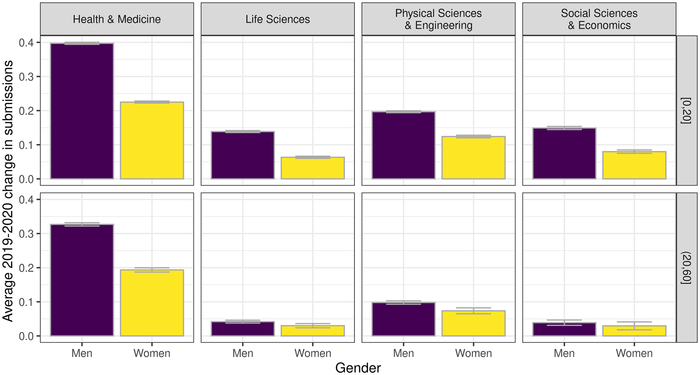A study of 2,329 academic journals has found that, during the first wave of the COVID-19 pandemic, fewer manuscripts were submitted by women than by men, and this gender gap was especially prominent in the medical field and for women in earlier stages of their careers. Flaminio Squazzoni of the University of Milan, Italy, and colleagues present these findings in the open-access journal PLOS ONE on October 13, 2021.

Credit: Squazzoni et al., 2021, PLOS ONE, CC-BY 4.0 (https://creativecommons.org/licenses/by/4.0/)
A study of 2,329 academic journals has found that, during the first wave of the COVID-19 pandemic, fewer manuscripts were submitted by women than by men, and this gender gap was especially prominent in the medical field and for women in earlier stages of their careers. Flaminio Squazzoni of the University of Milan, Italy, and colleagues present these findings in the open-access journal PLOS ONE on October 13, 2021.
Due to its wide-reaching effects on society, the onset of the COVID-19 pandemic prompted unusually high numbers of submissions of academic articles. Meanwhile, lockdown policies forced academics to handle new familial responsibilities, potentially exacerbating known family-related challenges for women in academia. Previous studies have examined this possibility, but the findings have been inconsistent.
To help clarify the impact of the pandemic on academic submissions, Squazzoni and colleagues applied statistical analyses to submission data from 2,329 journals published by the company Elsevier. They also examined data on academics who were invited to review submissions as part of the peer-review process. In total, data on over 5 million authors working between February 2018 and May 2020 was analyzed.
The researchers found that, between February and May of 2020, submissions to the Elsevier journals increased by 30 percent compared to the same period in 2019. However, women submitted fewer manuscripts than men across academic fields, including medicine, life sciences, physical sciences, and social sciences. This gender gap was especially strong in health and medicine—the field that is most directly related to COVID-19—and for women towards the beginning of their careers.
Meanwhile, for most academic fields, similar proportions of women and men accepted invitations to review manuscripts. However, this was not the case for health and medicine, in which women were less involved.
Overall, these findings suggest that the onset of the pandemic may have fostered an environment that was relatively advantageous for men in academia. Given the importance of publishing for academics’ career success, the authors note, the gender deficits observed in this study could potentially have long-term effects that deepen gender inequality in academia.
Bahar Mehmani, Elsevier’s Reviewer Experience Lead who coordinated the study, adds: “We undertook this collaboration with the research community to create a strong evidence base for investigating critical issues such as how lockdown measures during the pandemic have globally impacted women academics across different disciplines. This is very much part of our wider commitment to driving an inclusive research ecosystem.”
Journal
PLoS ONE
DOI
10.1371/journal.pone.0257919
Method of Research
Observational study
Subject of Research
People
Article Title
Gender gap in journal submissions and peer review during the first wave of the COVID-19 pandemic. A study on 2329 Elsevier journals
Article Publication Date
20-Oct-2021
COI Statement
BM is an employee of Elsevier and organized the data sharing process.




